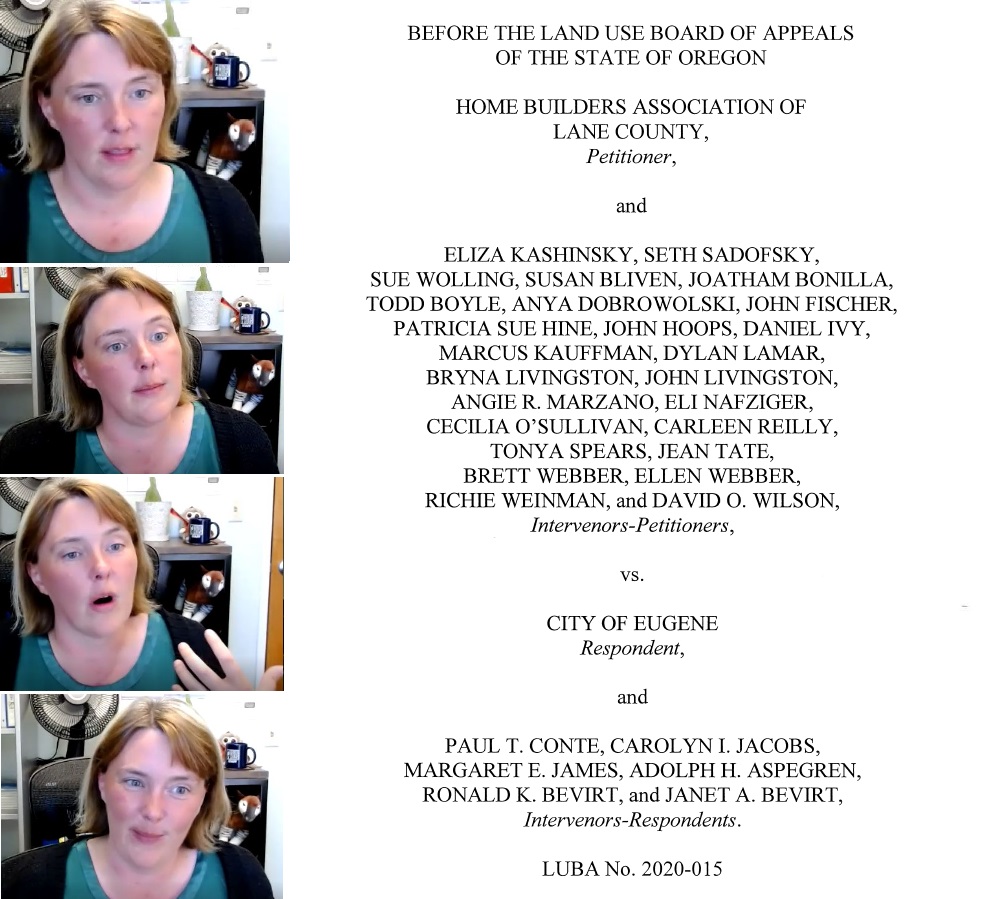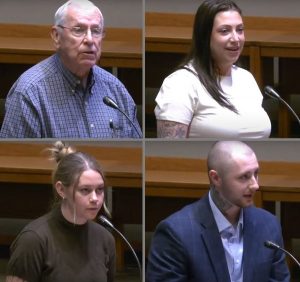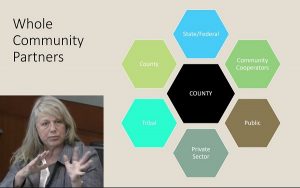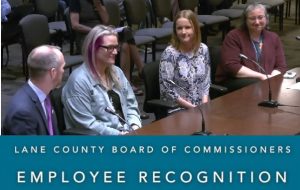Eliza: City’s approach to HB2001 will help address our growing housing crisis
7 min read
Eliza Kashinsky says the City learned from its experience with ADUs, conducting extensive community outreach to craft its approach to HB2001.
Eliza Kashinsky: Eugene has historically done the bare minimum when it comes to following state rules. … and so some of what I see is Eugene saying, You know, we tried with accessory dwelling units to do as little as we could get away with. Maybe we shouldn’t try that again, next time around, ’cause it didn’t really work the first time.
Eliza Kashinsky has been active in trying to address Eugene’s housing crisis. She and other citizens took the City to the state’s Land Use Board of Appeals, and won. They wanted the city to follow the law on Accessory Dwelling Units. Eliza says House Bill 2001 is a good thing.
Eliza Kashinsky: [00:00:41] House Bill 2001 was passed by the state in large part to help us address our housing shortage.
The amount of housing that we’re creating is just not keeping up with the number of people who are living in Eugene. Over the past 10 years, we’ve had almost 13,000 new people move into Eugene —that would work out to, roughly, six to seven thousand new households in Eugene. And that’s coming off of a period right after the recession, where there were many, many fewer houses being built. If you’ve looked for housing and Eugene over the past five years, you’ve been able to see how much more expensive it’s becoming.
A lot of the people who are concerned about House Bill 2001 talk about displacement and the inability of people to find, or stay in the neighborhoods to find housing and want to stay in the neighborhoods they want to be in. That’s already happening because of our housing shortage. A hundred year old home that sold six years ago for $300,000, that’s selling for almost half a million dollars. First time home buyers who perhaps would have been able to find those kinds of fixer uppers, they can’t find those anymore here now. And so House Bill 2001 is an attempt to try and catch up so that some of those pressures, some of that demand can be met, and we can stop seeing bidding wars where houses are being sold for over asking in, like, 20 minutes.
Thank you for supporting
local civic journalism
John Q: [00:02:11] Eliza said our lifestyles are also changing.
Eliza Kashinsky: [00:02:14] Now the households that we have in Eugene are getting smaller. You’re seeing a lot more retired couples without children, their children have moved out. You’re seeing a lot more young people who haven’t started families yet or who maybe don’t plan on starting families. You’re seeing a lot more single people who are living in their own households and you’re also seeing more multi-generational households. Maybe the adult children are living with the parents. Maybe the parents go to live with the adult children. Right. And so all of those household types need a different type of housing than the type of housing we’ve been building for so long, the three- four bedroom, detached, single family home with a big yard. That’s not the necessarily the ideal housing type for someone who’s retired and maybe wants to spend less time mowing their lawn or, you know, a couple that’s trying to start a family and at the same time work two jobs, right? And so part of House Bill 2001 is to try and help us get more housing to meet the needs of the communities coming here. And part of it is to try in part encourage housing in a type that is going to meet the needs of our future generations or future Eugene residents, and a lot of our current Eugene residents.
Eugene is recommending that we go beyond the minimum standards put forward by the state. Again, we have a history of doing the bare minimum. I’ve been heavily involved in the discussion around accessory dwelling units. We’re required by the state to be allow every single family homeowner who wants one to have an accessory dwelling unit. That law passed in 2017. Eugene is still not in compliance with that law. There had to be five appeals to the Land Use Board of Appeals in order to get Eugene to recognize, yes, we really do need to at least do the bare minimum when it comes to accessory dwelling units.
But the other piece of it is, most people in Eugene want us to go beyond the bare minimum, you know, people who, who have been looking to buy their first home, people who have been looking to find a place to rent our vacancy rate is and has been dangerously low, which contributes very much to increasing rents they are facing, they see the housing shortage and doing the bare minimum isn’t going to solve that.
And the city of Eugene has done probably more public outreach than I’ve ever seen them do. And more equitable public outreach. And so they really put some effort in to reaching out to communities that they haven’t heard from as much in the past. And what they got back from that is the vast majority want us to go beyond the barriers. They want us to incentivize and encourage that kind of housing. And so, you know, the city’s proposal is reflecting what the majority of people in their extensive outreach efforts have said that they will.
John Q. : [00:05:03] Some neighbors expressed concern. By allowing duplexes, triplexes, and quadplexes, they said, the city is creating an incentive for out-of-state corporations. They can buy an older home, raze it, and build several new homes in its place. Eliza addressed their concern.
Eliza Kashinsky: [00:05:19] So I think the first thing to understand is that, I have seen very little evidence that, that is a thing that is actually likely to happen. When you look at big out-of-state corporations, they function on mass scale. They’re not looking to build two units, three units, four units. Their profits are built off of building hundreds of units. And so where you really see these big companies coming in is when you’re talking about hundreds of units. And that can be the form of a large apartment complex with hundreds of units. We’ve seen several of those in Eugene. And that can be in the form of suburban style, sprawly, single-family homes.
But they really make their money by having a cookie cutter approach. Infill middle housing development does not lend itself to a cookie cutter approach. You’re talking about one lot here, one line there, adding a couple of units here, a couple of homes there. It’s very, very difficult for a big out-of-state company that functions on that mass scale to, to actually make a huge profit that way. The math just doesn’t work for them. And Eugene’s code is still going to be unique enough after all of this, that you wouldn’t be able to put in a plan written in Florida in Eugene.
So when you look at infill middle housing and the infill middle housing that has been created in Eugene over the past 20 years, that development is primarily being created by local people. Sometimes it’s the homeowner who’s making their own choice to add a duplex, add an ADU, convert some of their house into another unit. Sometimes it’s a local developer, but it’s almost always someone who knows the community, respects the community. They live here too.
And so, you know, I think this specter of bulldozers waiting at the edge of Eugene just to come in, as soon as we change our code, it’s incredibly unlikely. And I think avoiding our hope for a better Eugene and a Eugene that better meets the need of our residents based on this fear is what’s going to keep us being challenged with our housing crisis.
The other thing that I’ll note is that house Bill 2001 isn’t just about new construction. House Bill 2001 has a lot of allowance in there for conversion for taking, say, a 2000 square foot home that was built 50 – 100 years ago and converting it into two or three units. And that has a lot of appeal for especially people who, you know, maybe they had a family in that house and now they want to retire. And the rental income from the other half will help them do that. And it preserves that older home, right? It converts what was ideal for one group into now, what is ideal for two households.
So when you look at the questions of the lot sizes, that’s not just so that a someone building a new home could go in and do that there. It’s also so that someone living already living on a 4,500 square foot lot could convert their existing building, which right now under our code, they wouldn’t be allowed to do. And there’s actually been a number of cases: A duplex already on his lot, but because it was made into a duplex in the 1950s, he couldn’t trace back the paperwork, and so he was told it had to be a single family home. Whereas now that existing building would be allowed to be a duplex under the new House Bill 2001. So he didn’t need to do anything. He just needed to get a rubber stamp that says this is allowed.
And so House Bill 2001 isn’t just about, ‘Oh, let’s build new housing.’ It’s about how can we reconfigure the housing that we already have to better meet the needs of our population as we continue to grow, as our households continue to change.
John Q: [00:09:46] The city is in its code writing phase through the fall.



